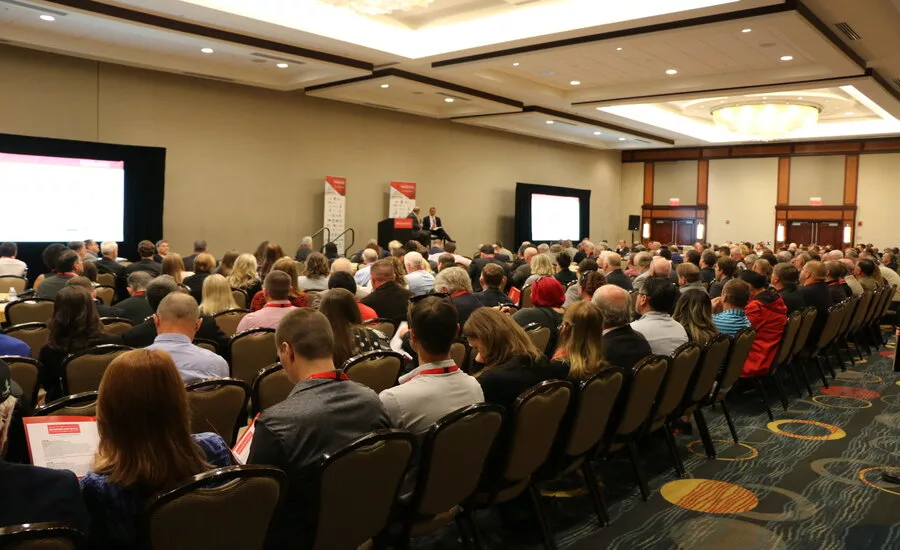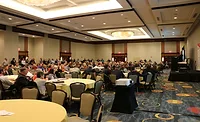Roofing Day Returns to D.C.
More Than 400 Roofing Professionals Hit Capitol Hill to Talk Industry Concerns, Garner Support

Participants in Roofing Day 2019 prepare to meet with members of congress in Washington, D.C. They were given packets of information to present that included, among other things, a letter explaining why the roofing industry supports the Workforce for an Expanding Economy Act. Photo by Andrew Dietderich.
WASHINGTON, D.C. — More than 400 roofing professionals converged on Capitol Hill for the second annual Roofing Day last month in a concerted effort to let members of congress know their biggest concerns and to show support for bills that could spark much-needed change.
Organized by the National Roofing Contractors Association (NRCA), industry representatives from Florida to Alaska took to the Hill on April 4 focused on three primary issues: immigration, workforce training, and public infrastructure.
Modeled after last year’s inaugural event, a total of 278 meetings were pre-arranged with members of congress and congressional staffers during the national fly-in.
NRCA CEO Reid Ribble said attendance was up about 5 percent compared with last year and about half of the attendees participated in Roofing Day for the first time — a sign that already has him looking forward to next year and beyond.
“The larger this event grows the more we will begin to put wins on the board for the roofing industry here in Washington, D.C.,” Ribble said. “But the way those wins occur is by the relationship building that occurs when adults who care about their country sit down and they talk and they share…and they build relationships with congressional staffers and their bosses so that they begin to trust the information we’re giving them.
“And that means we have to do this every year, year-in and year-out.”
Ribble began discussing the idea of a roofing industry ‘fly-in’ to lobby congress in 2017, saying the stakeholders — roofing contractors, suppliers and manufacturers — needed to do a better job of speaking with a collective voice in Washington.
The NRCA and its political action arm, ROOFPAC, again designed the event with political consultants from D.C.-based Prime Advocacy, and modeled it largely after what Ribble said he saw as a three-term member of the U.S. House of Representatives from Wisconsin.
Many who attended Roofing Day called it paramount to the future of roofing.
“Last year it felt like ‘Will they notice us?’” said Charles Antis, owner, Irvine, Calif.-based Antis Roofing & Waterproofing. “This year, I know they notice us. So as a group, we want to go in and say ‘We need more help.’”
Early Arrivals
The National Women in Roofing kicked off the effort with an inaugural Roofing Day Women’s Luncheon with featured speakers U.S. Rep. Angie Craig, D-Minn., and U.S. Rep. Suzan DelBene, D-Wash.
“There are many ways for women to have a voice and be politically engaged without running for office,” said Jennifer Stone, NWIR chair. “One of those ways is to attend events like the NRCA Roofing Day and NWIR Roofing Day Luncheon. By having meaningful conversations with other women and men in the roofing industry and participating in Roofing Day, we can make sure that members of Congress are hearing directly from the roofing industry and women overall about our thoughts and concerns.”
The NRCA also hosted a welcome event where Duane Musser, vice president of government relations, briefly reviewed the three primary issues roofing professionals were asked to advocate for:
- Immigration reform to address nationwide “chronic workforce shortages;”
- Expanding workforce-training incentives;
- Supporting legislation aimed at improving the infrastructure of public buildings.
“We have a lot of members of congress who don’t understand business,” Musser said during the welcome. “This is our opportunity to go up, tell your story, talk about the challenges that you face as an employer.”
U.S. Rep. Lloyd Smucker, R-Pa., and U.S. Rep. Denver Riggleman, R-Va., spoke during the welcome and acknowledged many of the issues facing the roofing industry.
Smucker described the workforce shortage as reaching “crisis proportions.” He said that’s why he is sponsoring the Workforce for an Expanding Economy Act — which would essentially use market demand to determine how many qualifying visas are issued.
“If we’re not able to find solutions to our workplace shortages, it will have an impact on our economy,” Smucker said.
Getting Down to Business
The following day, state delegations armed with packets containing position papers walked the halls of government.
One of the position papers called for support of infrastructure through the proposed Public Buildings Renewal Act. NRCA officials said that the average public school building is at least 40 years old and the current backlog of maintenance and capital projects represents an annual funding gap of $45 billion.
The bill would spur private investment in public building infrastructure, which is currently limited because, unlike the transportation sector, buildings are not eligible for tax-exempt facility bonds.
Two other position papers addressed what NRCA called “a chronic shortage of qualified workers.”
One hit on the need for immigration reform and participants asked members of congress to co-sponsor the Workforce for an Expanding Economy Act and to support advancing the Dream and Promise Act.
The Dream and Promise Act aims to provide qualifying Temporary Protected Status (TPS) workers with legal permanent resident status. NRCA said it would “enable hardworking individuals with a strong track record to continue contributing to their companies and our economy.”
The Workforce for an Expanding Economy Act aims to establish a visa system that is governed by market forces. In short, it calls for the allowance of more visas in times of robust economic activity. Participating employers would need to use E-Verify, be located in an area with unemployment of less than 5 percent, and “test the market and attest the position cannot otherwise be filled.”
The two acts occupied much of the meeting attended by more than 20 roofing industry professionals from California who crammed into a small conference room in the office of Sen. Dianne Feinstein, D-Calif. Antis lead the meeting, noting that roofing is a $100 billion-plus industry with more than 500,000 workers — and in need of tens of thousands more.
Roofing Day participants also discussed workforce training incentives and asked members of congress to co-sponsor the Jumpstart Our Businesses by Supporting Students Act and the College Transparency Act.
The College Transparency Act is a bill that calls for more access to post-secondary educational and workforce data. The idea is that students and parents will be able to better compare the costs and economic returns of pursuing careers in trades like roofing with that of pursuing college degrees.
Jumpstart Our Businesses by Supporting Students Act calls for extended eligibility for Pell Grants to short-term/competency-based workforce programs. If approved, students could receive assistance for programs such as the new NRCA ProCertification.
Ribble, in a one-on-one meeting with Rep. John Rose, R-Tenn., also noted the worker shortage.
He told Rose others asked him throughout the day why the industry doesn’t just pay better.
“I said we wished that was all it took,” Ribble said. “If it were just raising wages we could solve the problem. But you have to have people coming to the door.”
In asking for support, Ribble bluntly stressed that the worker shortage is at “near crisis levels right now.”
“And I hate to use the word crisis because that word gets through around a lot, but we don’t know what the solution is,” he said. “We’re a bit flummoxed because congress doesn’t seem to care.”
Seeing Results
Pinpointing a precise impact of Roofing Day is difficult, but Ribble said he believes his meeting with President Trump’s Chief of Staff Mick Mulvaney was a direct result. Ribble announced the west wing meeting — the first of its kind for NRCA — during the opening reception.
“We met with the chief of staff of the President of the United States, and that is, in part, because they now see the industry as a whole…they get to look at us through a different set of eyes,” Ribble said.
Joined by current NRCA chairman Ken Schwickert and incoming chairman Nick Sabino, the trio explained that the chronic shortage of qualified workers is the most significant limitation on the ability of the roofing industry to grow. They also were able to explain that the problem will become even more acute in the future because of an aging workforce, educational trends and ongoing rebuilding efforts resulting from recent hurricanes and other natural disasters throughout the U.S.
Concurrently, many Roofing Day attendees said they feel it’s important to at least try and do something about the issues discussed in D.C.
“We need a voice in Washington and it needs to come from us,” said Dave Welch, owner of Ben Hill Roofing of Georgia. “When I heard Reid Ribble say he was here (as a legislator) for six years and not a single roofer had come to see him, I started realizing I should have went up there.”
Mark Duffy, of Joiliet, Ill.-based Elens and Maichin, said he proudly joined a group of attendees from the Chicago area.
"I think it's important for our industry," Duffy said. "Whenever we can get the voice out there the entire industry is better off."
Trent Cotney, CEO, Cotney Construction Law, said in 2018, “it was probably the best thing I did all year.”
“We all sit around in our meetings and we talk about this is a problem or that is a problem — this is doing something about it,” Cotney said. “We are empowering our industry by doing this.”
Andrew Dietderich is the managing editor of Roofing Contractor and can be reached at dietdericha@bnpmedia.com.
Looking for a reprint of this article?
From high-res PDFs to custom plaques, order your copy today!








